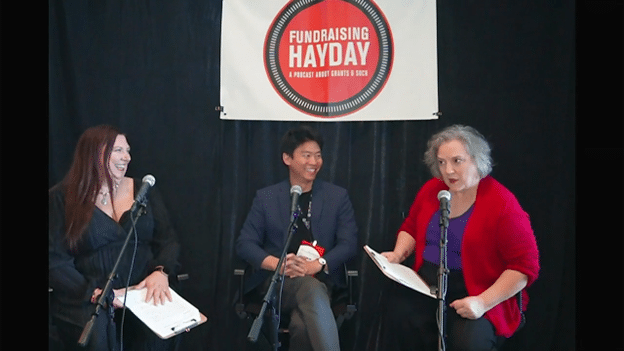As frigid winter blankets most of the United States, it may help to think back to the long hot summer of 2023—including the annoying boy math vs. girl math memes—later expanded to dog math, cat math, and maybe even llama math.
But how about Artificial Intelligence (AI) math? Or according to AI thought leader and Grantable co-founder, Philip Deng, one of the best ways to understand how AI is different than our traditional concepts of software is to comprehend how it gets the answers to our prompts.
And it’s probably not what you think.
The first episode of Season 7 of the Fundraising HayDay Podcast features a wide-ranging interview about the nature of AI and how nonprofits and other agencies can best harness it to streamline operations such as donor data analysis and grant writing and management.
The AI math, though. That’s the key.
Philip explained that unlike software built on data codes with interactive features such as buttons, tabs, etc., that performs searches based on coding, AI works through complex math problems based on probability theory. He quoted Demis Hassabis who leads DeepMind at Google for a simpler AI definition that is “technology meant to imitate or approximate human intelligence.”
“It’s not running a set line of code. It’s performing an extremely complicated mathematical problem and turning that into your response,” Philip said.
For example, ChatGPT translates the prompt entered from words and phrases into numbers and then uses probability to determine what the answer would be, as opposed to scraping the internet for the best answer to cut and paste back into the chat window. As he explained, there’s no reference step, just incredibly complicated equations based on huge amounts of training data—searching for patterns in that data.
And that’s where we all come in. Another key point among so many in the podcast episode—to get the best results we need to approach AI as a nonprofit community as a whole.
He recommends Fundraising.AI as a member organization of individuals and nonprofits dedicated to using AI ethically and responsibly.
I’ll leave you with another fascinating take on interacting with AI according to Philip—engage playfully. If you’re anxious about working with AI, he suggested using general-purpose AI platforms such as Google Bard and ChatGPT in a non-work mode to start off. Set up an account with an email address you don’t mind sharing. Then, ask it to tell you a story, generate a menu for an upcoming dinner party, and just see what happens.
As he put it, “Failure is reframed to be a much more temporary outcome that’s part of the game or part of the experience.”
Check out the full interview here.
And let me know how AI is playing out for you.
Kimberly Hays de Muga, GPC, is an expert trainer and coach in nonprofit capacity building, grant writing, fundraising, and board development. She brings more than 25 years of fundraising experience that includes raising $100 million from individuals, foundations, corporations, and local, state, and federal funding for nonprofit agencies in the education, health, and human service sectors—from food banks to pediatric hospitals, to state-wide mental health coalitions.
Latest posts by Kimberly Hays de Muga
(see all)



